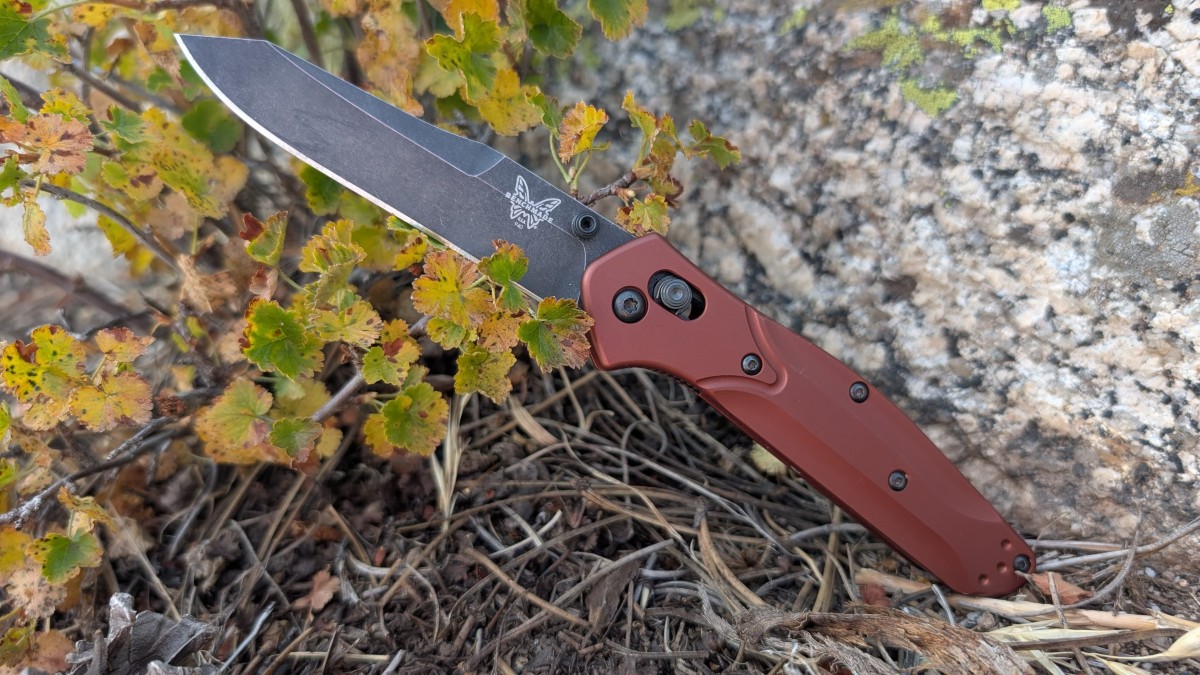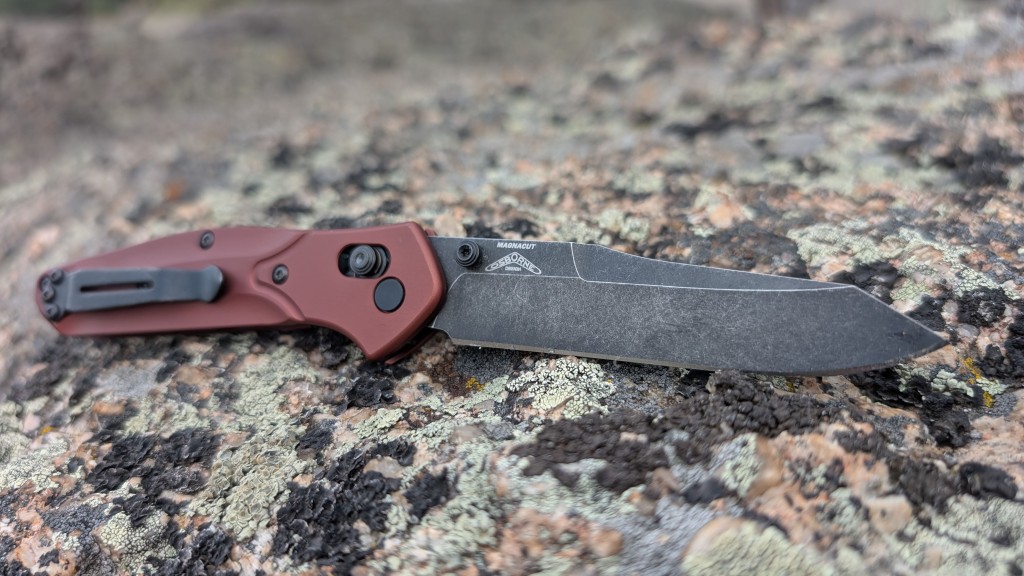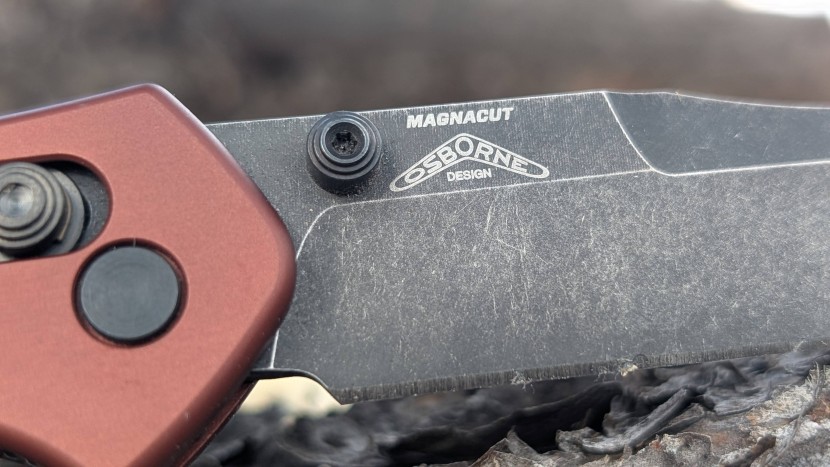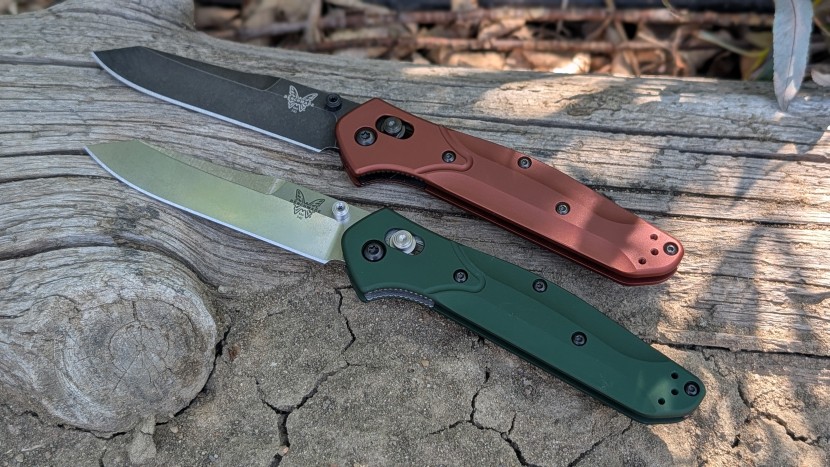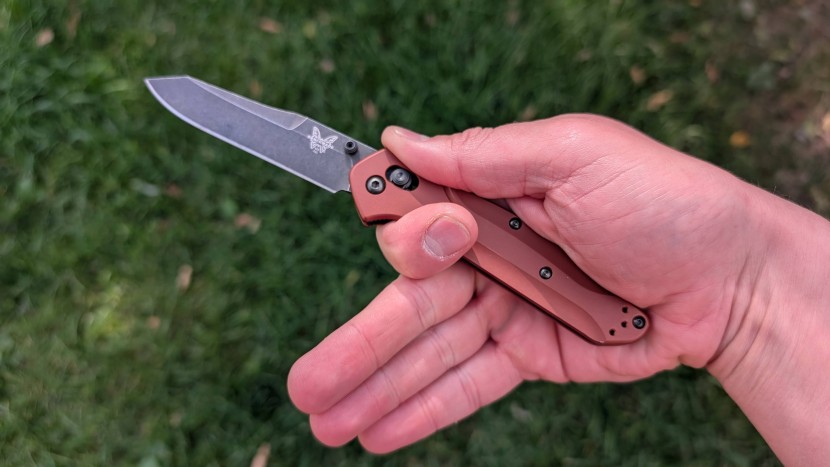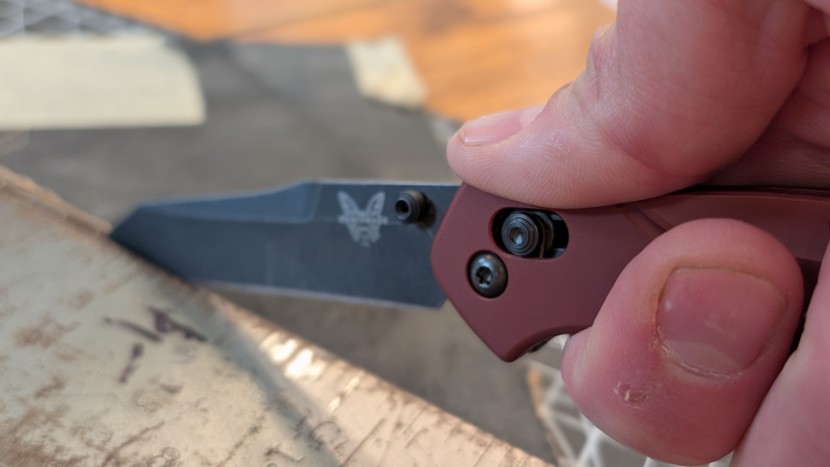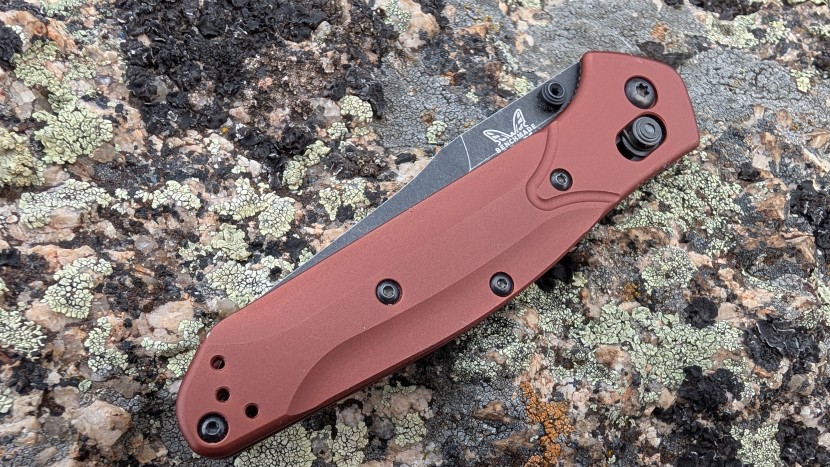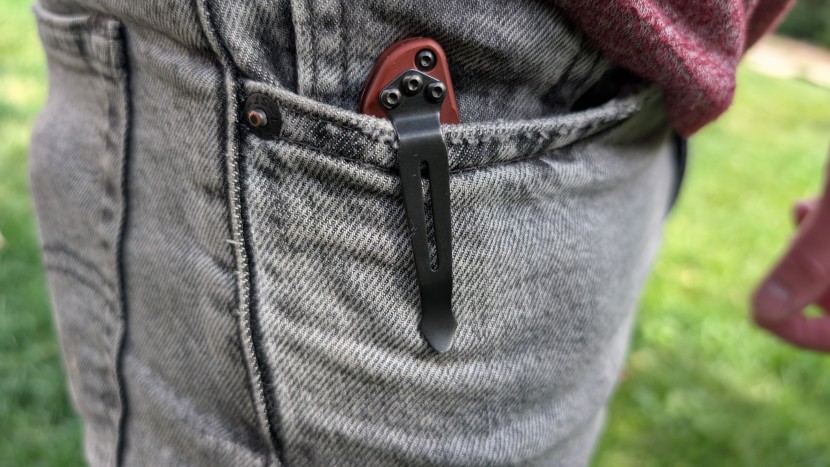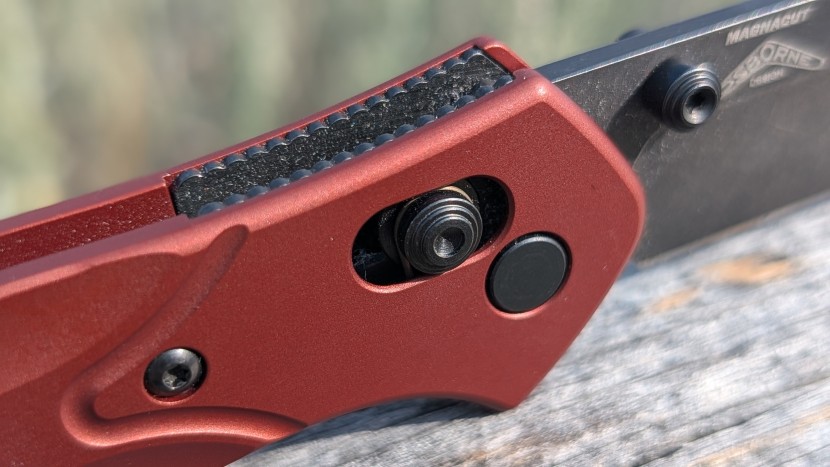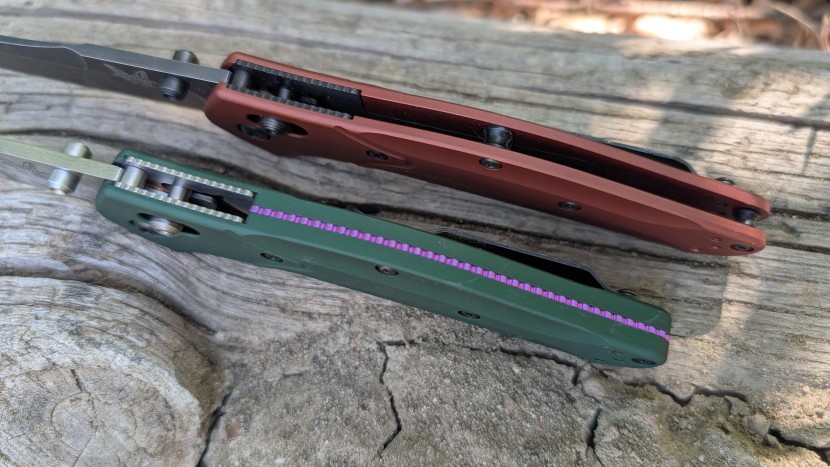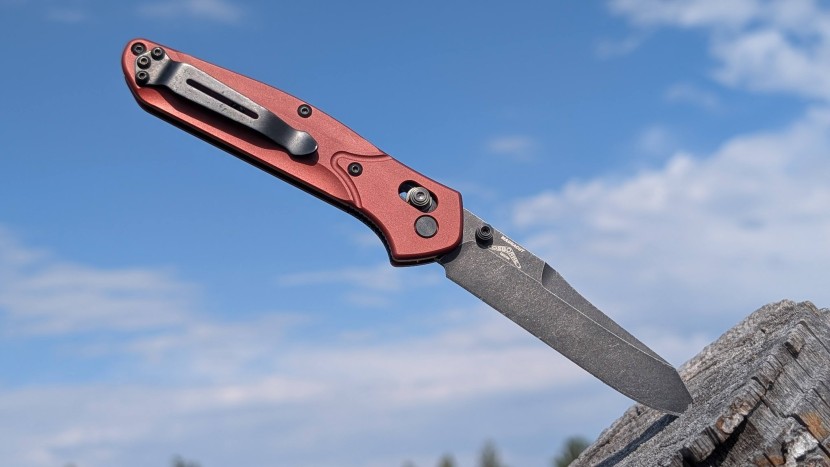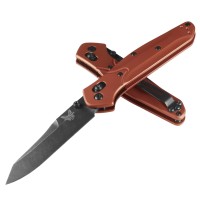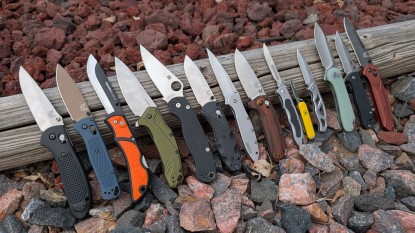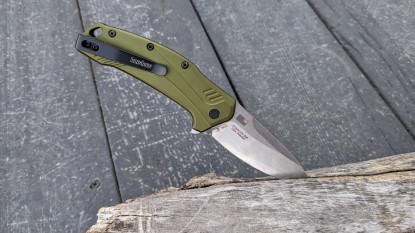
Our Verdict
Our Analysis and Test Results
The Benchmade 940 Osborne gets our vote for the most balanced (and possibly most beautiful) pocket knife we've had the pleasure of reviewing. It doesn't do any one thing best, but ultimately we have a hard time finding any use that the Osborne wouldn't be appropriate for.
Blade and Edge Integrity
The Osborne is perhaps most well known for the distinct blade shape it sports. It's a rare reverse tanto, which effectively gives a longer effective cutting edge paired with a reinforced tip. The blade is an impressive 3.33 inches, surprising for how slim the overall profile is, and approximately 2.25 inches of that is a truly straight edge. A gentle slope up to the tip meets the sharp downward tanto chisel from above, and includes some prominent grinds along the top of the blade (referred to as swedge grinds). All resulting in a blade that's fantastic for both stabbing and cutting tasks (but not ideal for wedging or prying).
The 'standard' Osborne uses a S30V blade, which is a top-tier alloy in its own right, known as a great all-around performing option with above-average corrosion resistance and edge retention. However, we chose to review the upgraded variant so we could put the MagnaCut stainless steel blade through its paces.
MagnaCut is arguably the best all-around knife steel available today; it has similar edge retention as S30V, with markedly improved toughness and corrosion resistance scores. This option (SKU:940BK-03) also includes Benchmade's DLC Battlewash finish. The DLC (Diamond-Like Carbon) coating is ostensibly for added corrosion resistance, which is quite simply not needed for a MagnaCut blade. Instead, we believe the choice was made entirely for aesthetic reasons — to pair a striking, distressed black blade with the burnt orange scales. We don't mind!
Ergonomics
The Osborne was designed as a sleek, stylish, but full-sized knife. It is portable without sacrificing too much performance. Ultimately, we think an effective compromise was made here.
The all-metal handle is slim, but quite long at 4.5 in closed (7.81 in open). It's long enough for the pinky on most hands to have at least some around the butt, with a comfortable curve for the forefinger to sit in. The anodized aluminum scales (the decorative caps on the handle, covering the steel liner) give a great slick, but safe-feeling grip.
We do have a few minor gripes, though: the scallops in the handle are a little too subtle for true added grip, and to that point, the handle is too slim to really sit fully in the hand. Instead, it fits best fully held in the fingers, with the fingertips locked into the palm for security. The thumb rest does have some good jimping (ridges added for grip), but it is a little too shallow to handle a ton of pressure without slipping forward. The Osborne is advertised as a true tough-tasks cutting tool, but after testing, we only feel comfortable recommending it for light and medium-duty cutting tasks. Leave the heavy-duty cutting and prying to a beefier option.
Benchmade's well-known Axis locks are fantastic. They're solid, safe, and innovative. The Osborne sports the non-assist open Axis, meaning there's no spring assist to snap the blade open with a flick of the thumb stud. We're a little disappointed here, as an assist open on the blade action would be really nice for this knife (and luckily they did make a fully auto option, #9400, which… is even pricier). As it is now, the thumb studs built into the blade are a little too close to the handle for proper leverage for manual opening, resulting in a 'false start' far more often than we'd like on a knife in this price range.
Portability
Benchmade claims the 940 Osborne is “highly regarded as one of the most quintessential EDCs of all time.” We couldn't agree more.
EDC (everyday carry) knives are one of the more competitive market segments in the industry, and the Osborne does it better than just about anyone (possibly only outdone by the excellent Kershaw Leek). Creating a knife that is slim and lightweight for pocket carry, but which still feels solid, comfortable, and secure in hand is a tall task.
We will note that the best EDC knives aren't necessarily the most portable. EDC has evolved past pure profile and weight concerns; it must be an exceedingly useful tool as well. While a variety of smaller knives will obviously be more portable, we'd argue that utility greatly suffers if you can only get two or three fingers around the handle, and it can only handle the lightest of cutting tasks.
This Osborne weighs a reasonable 2.7 ounces (though the standard version has an added ridge insert in the handle, bringing it to 2.9 oz). That's by no means the lightest option out there, but it is just about the lightest full-sized knife we've seen. And as discussed above, the handle shape is short and thin, but long: perfect for pocket carrying. The pocket clip can be swapped for lefties, but both orientations are tip-up (for quick deployment when pulled from the pocket), which is ideal. The clip is a little too strong for our liking, though, and could cut up a pocket edge over time. Plus, it's not a deep-carry design, which we prefer on our EDC knives, so it'll stick out the top of the pocket by 3/4 in or so.
Construction Quality
If Benchmade is known for anything, it's their quality construction, and the Osborne is no exception.
The blade is perfectly centered, the edge grind is flawless, and there's no sign of poor quality control anywhere to be found. The action on the pivot is smooth with no play or wiggle whatsoever. Our complaint with the opening action is with the placement of the thumb stud, which gives poor leverage, not with the construction itself.
Full disclosure, our team has owned several Osbornes and many Benchmades over the years, and the build quality is always top-notch. However, the lock on this particular test model sometimes catches a little when releasing to close. This seems to happen after a particularly forceful open, and try as we might, we can't see any flaw with the lock or where it engages the blade at all, which would catch. Nonetheless, it's there.
Honestly, a large driving factor in the stellar construction score is that it's all metal. Not that aluminum is some exotic material, but there's a subconscious belief which is hard to see past, that metal feels more reliable and inherently 'better' than plastic. As good as we know the various composite and plastic handles found on all kinds of top-end knives are… the cool, smooth anodized aluminum handle on the Osborne just feels better.
Should You Buy the Benchmade 940 Osborne?
The beauty, utility, and staying power of the Osborne is really due to its excellent design. A design which is present both in the standard model and the upgraded variant we tested. But at $240 or $300, it's undoubtedly an expensive tool.
If you can stomach the cost, we think the Osborne is equally appropriate as a slim, workhorse tool for tradesmen as it is an occasional-use statement piece in white-collar environments. It'll also fit nicely as a showpiece in a growing collection.
What Other Pocket Knives Should You Consider?
Not surprisingly, performance correlates with price; most of the highest-scoring knives sit above the $200 price point. Our top recommendation is the Benchmade sibling Mini Barrage, which is assisted open and feels better in the hand, but isn't as portable as the Osborne. For better portability in a knife that isn't puny, you're looking at the Bugout or the Leek. The Leek has a similar sleek aesthetic and is more than $100 less, but it's meant for lighter-duty tasks. It and the Osborne are 1A/1B for the best EDC knife, so you can't go wrong with either.
| Awards | Stylish High Performer |
|---|---|
| Price | $300 List Check Price at REI |
Overall Score  |
|
| Star Rating | |
| Bottom Line | A work of art that doubles as a workhorse tool |
| Pros | Reverse Tanto blade, all metal construction, slim |
| Cons | Poor leverage when opening, cost, shallow thumb rise |
| Rating Categories | Benchmade 940 Osborne |
| Blade and Edge Integrity (30%) | |
| Ergonomics (25%) | |
| Portability (20%) | |
| Construction Quality (25%) | |
| Specifications | Benchmade 940 Osborne |
| Blade Style | Reverse Tanto |
| Blade Length | 3.33 in |
| Blade Material | CPM MagnaCut stainless steel |
| Weight | 2.7 oz |
| Length Closed | 4.5 in |
| Length Open | 7.81 in |
| Closed Thickness w/o Pocket Clip (Measured) | 0.42 in |
| Blade Thickness | 2.92 mm |
| Closed Blade Lock | No |
| Open Blade Lock Mechanism | AXIS lock (proprietary) |
| Handle Material | 6061-T6 Anodized Aluminum |
| Opening Style | Ambidextrous thumb stud |
| Carry Style | Pocket clip, lanyard hole |
| Other Features Or Functions | Lanyard hole, 2 position pocket clip |


